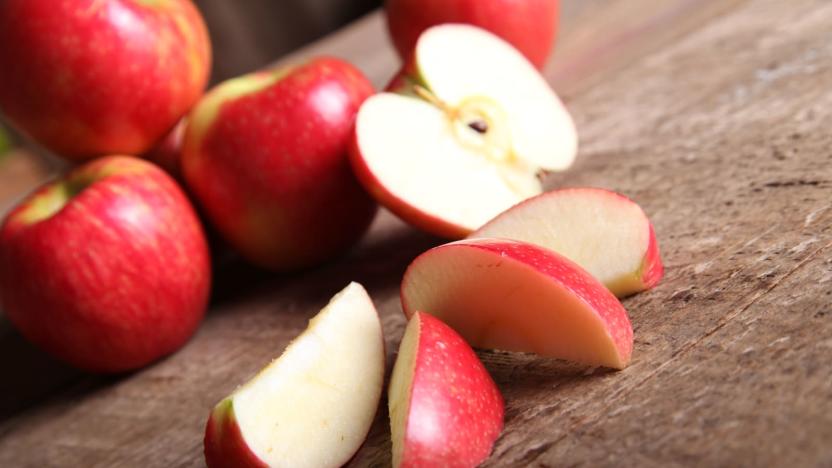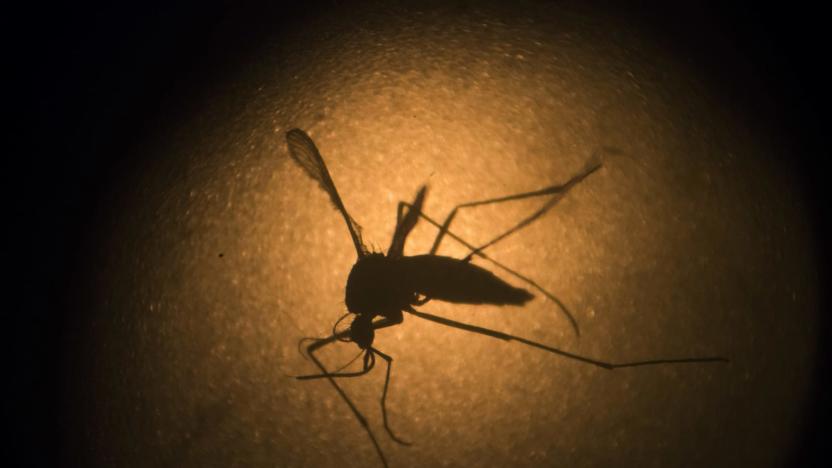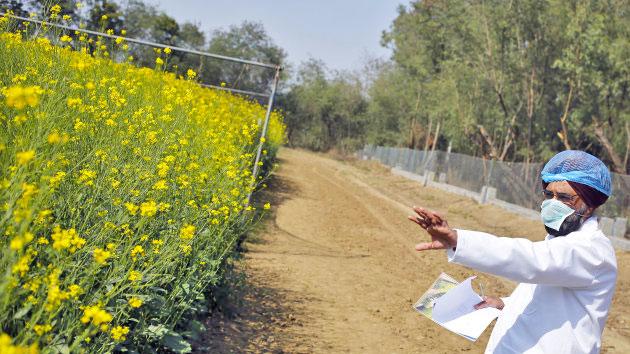gmo
Latest

Hitting the Books: A brief history of industrial espionage and corn
Welcome to Hitting the Books. With less than one in five Americans reading just for fun these days, we've done the hard work for you by scouring the internet for the most interesting, thought provoking books on science and technology we can find and delivering an easily digestible nugget of their stories.

Non-browning GMO apple slices go on sale next month
Mushrooms won't be the only non-browning produce on store shelves for long. Thanks to genetic modification, we'll soon see Golden Delicious apples that don't oxidize for three weeks after being cut, bruised or bitten into. They'll be sold in packages of slices and will go on sale in the Midwest in February and March. According to Arctic, the company responsible for the fruit, this feat was achieved by "silencing" polyphenol oxidase (PPO) expression.

Alphabet is working to squash the Zika virus, too
There are a few ways to kill off a pest: eliminate its food supply, or, make sure it can't effectively procreate. Since the pest in question for this post is mosquitos, the former solution isn't an option. So, Verily, the life-science division of Alphabet Inc., is addressing the Zika-carrier with a spin on the latter, according to MIT Technology Review.

GOP and industry agree: Tech has a messaging problem
The government and the technology industry agree: They need to do a better job educating the public. During a policy forum hosted by the Information Technology and Innovation Foundation (ITIF) at the Republican National Convention this week, members of Congress and several industry veterans admitted they have not done enough to dispel myths around technology, nor have they found the proper way to push Americans toward degrees in STEM fields. Congressman Blake Farenthold from Texas said "everyone still wants an MBA," even though you'd probably make more money with a degree in engineering.

Senate approves national GMO labeling standard
The Senate has voted 63-30 in favor of a bill that would enforce a GMO labeling standard for the whole country. If it passes, food manufacturers would be required to disclose genetically modified ingredients in their products through a label on an item's packaging. It doesn't mean bad news for those manufacturers, though -- in fact, the bill's requirements work in their favor. A more stringent GMO labeling law went into effect in Vermont on July 1st, and food companies were unhappy because it could lead to different laws per state that would be a nightmare to implement.

Bayer to use satellite imaging to modernize farming efforts
You probably know Bayer for its aspirin. But the multinational pharmaceutical company has its fingers in more pies that that -- it's also keen to become a force in agriculture. As part of a push to focus on its Crop Science division, the company's partnered with Planetary Resources, an aerospace tech company, to create products and services using data obtained from satellite imagery. The goal? To sell services and tools to farmers that will make agriculture more efficient and environmentally adaptable. Though the collaboration has just been announced and, therefore, no services have yet been created, Bayer's indicated a few key areas where satellite data could be beneficial: water conservation through more ideally timed irrigation; recommendations on timing for crop planting; and the ability to determine what soil will hold water best.

National Academy of Sciences finds GMOs to be 'safe'
The debate surrounding the safety of genetically modified organisms (GMOs) has been raging for years and continues to do so. The National Academies of Sciences, Engineering, and Medicine has finally weighed in on the matter and found GMOs to not just be generally safe, but good for both people and the environment. The academy has even gone so far as to set up a dedicated website where visitors can peruse the source data that the academy leveraged for its study.

Genetically modified mushrooms cleared by the USDA
While the ethical debate rages on about genetically modified human embryos, the United States Department of Agriculture has cleared its first CRISPR-modified organism. CRISPR, in case you've forgotten, is an editing technique that can alter the genome of almost any organism pretty easily. Penn State University's agriculture department used the method on white button mushrooms to include an anti-browning phenotype that reduced the polyphenol oxidase enzyme (turns produce brown when exposed to air) down to about 70 percent effectiveness. Popular Science notes that because CRISPR doesn't use bacteria or viruses to affect the DNA like previous methods have, these 'shrooms aren't considered "plant pests."

FDA approves world's first GMO fish: fast-growing Atlantic Salmon
In a landmark decision more than two decades in the making, the US Food and Drug Administration announced its approval of a genetically modified Atlantic Salmon variant on Thursday. The AquAdvantage salmon, which was initially developed back in 1989 and submitted for approval in 1995, grows far faster than its conventionally bred brethren. The FDA has deemed it safe for human consumption, equally nutritious as other salmon varieties and not dangerous to the environment. And since the GMO salmon is considered nutritionally equivalent to regular salmon supermarkets will be able to carry the fish without having to label them being GMO.

Modified rice plant produces more grain, less methane
Apparently, the secret to better, more eco-friendly rice plant is another type of grain: barley. A team of scientists has created genetically modified rice that borrows a single gene from barley and found that the altered organism can generate up to 43 percent more grains per plant. Plus, its methane emission is down to 0.3 percent, a lot lower than regular rice's 10 percent emission observed during the scientists' experiments. Methane, as you might know, is one of the most potent greenhouse gases and is the second most prevalent in the US after carbon dioxide.




